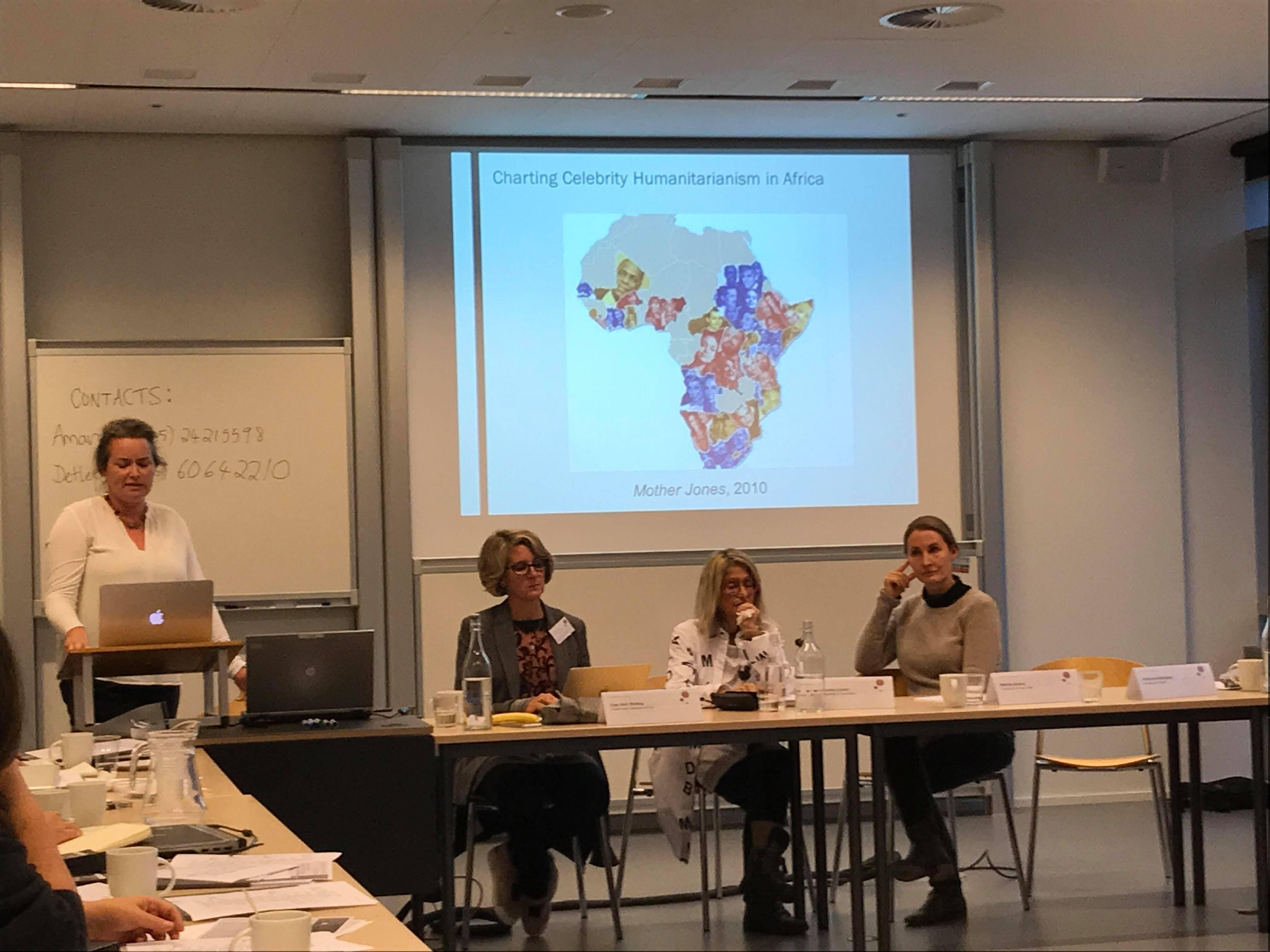Let's Talk Human Rights

Celebrity, Protest, and South Africa in Copenhagen
By Alexandra C. Budabin
Last week, I attended a conference on “Celebrity and Protest in Africa and in the Anti-Apartheid Struggle” at the University of Copenhagen. The conference was an opportunity to share research conducted as part of the European Council Research project “Apartheid—The Global Itinerary: South African Cultural Formations in Transnational Circulation, 1948-1990” led by Louise Bethlehem of the Hebrew University of Jerusalem. The project aimed to “trace the global diffusion of apartheid-era expressive culture, whether textual, musical or visual, in a Cold War setting”. Panels showcased work on literary celebrities, music, and performance. Dr. Bethlehem delivered a keynote on “Stars in the Southern Hemisphere” that looked at the “global itinerary” of the exiled South African jazz singers Miriam Makeba Hugh Masekela as a means to challenge the neglect of Africa as an arena of agency.
The body of this work on the cultural resistance to apartheid looked at celebrities and their modes of protest. There was a fascinating presentation by Tal Zalmonovich on how prominent activists such as Anglican priest Trevor Huddleston consciously engaged in processes of celebrification to build their moral authority and exploit wider attention to support protests within South Africa. Presentations by Sonja Narunsky-Laden and Martha Evans looked at Nelson Mandela. Evans showed how his early activism during his show trials prior to imprisonment sowed the seeds of “the Mandela myth”, or his “Madiba magic”. Following his release from prison, Mandela’s performative capabilities, argued Narunsk7-Laden, engendered his ability to generate symbols, leading to his efforts to re-brand South Africa in the post-apartheid era.
As a young girl who sang South African freedom songs in choir and who later met (and hugged!) Nelson Mandela, I was especially excited for the panel on Protest: USA focus. The case of South-African anti-apartheid activism in the US has been a critical story in the canon of transnational protest. Danny Widener had his own childhood recollection of hearing Mandela speak in 1990 as part of his Freedom Tour. This led to Widener’s later work on the role of California, site of the largest university divestment campaign. Widener highlighted protests against celebrities who violated the South African Cultural Boycott as well as mass mobilization in the Black Community as a form of transnational solidarity. Myra Houser continued the conversation but from the perspective of what was happening in Washington, DC and how this was considered part of the US civil rights movement. She focused on the Southern African Project of the Lawyers’ Committee for Civil Rights Under Law and anti-apartheid legislation, which often failed. She discussed the “Designer Arrests” of prominent individuals, including Rosa Parks, at the South African embassy protests, which continued for over two years, the largest act of civil obedience in US history. I was moved by Houser’s showcasing of letters written by YMCA children to President Botha, plaintive misspelled appeals written on loose-leaf paper that carried great emotional weight. Those of who were witness to and part of the anti-apartheid protest, in whatever small ways, feel as though we all played a part in what was a decades long struggle encompassing waves of global movements and political action to address oppression in South Africa.
While most of the presentations focused on South Africa, there was general discussion on the engagement of celebrities in social and political struggles. This is where my collaborator Lisa A. Richey and I came in, presenting work we’ve conducted as part of the Research Network on Celebrities in North-South Relations. I gave a presentation on “Building Solidarity through Coffee? Celebrity Humanitarians and Brand Aid Initiatives” that drew from our current book manuscript on Ben Affleck, Starbucks, and Eastern Congo. I argued that the trend around celebrity-led partnerships with causes and coffee companies offers limited possibilities for transnational solidarity with mixed outcomes for the field of peace and development. I compared Affleck’s efforts to those of George Clooney, who has marshalled his brand ambassadorship with Nespresso to encourage the country to investment millions of dollars in rebuilding Southern Sudan’s coffee sector. These alliances may bring new actors and funding to peace and development but they also reinforce approaches to politics that solidify Northern and elite power in ways that may or may not benefit the local recipients in Africa. Richey gave a second keynote on the “Neoliberal Politics of Celebrity Humanitarians.” She discussed how, when celebrities become involved in North–South relations, money is pledged, individual and institutional networks are mobilized, and attention is drawn toward particular crises, and deflected from others. Richey presented six tropes of celebrity engagement: aid celebrities, global mothers, strong men doing good, diplomats, entrepreneurs, and Afropolitans. She argued that celebrity humanitarianism offers a politics that is based on authenticity not accountability.
Taken together, the conference put in conversation scholarship on historic celebrity engagement and current celebrity interventions in ways that broadened and deepened our understanding of celebrity and its uses (and abuses) as a tool for protest. Important research is being conducted on how celebrity figures (and their fans) are able to promote meaningful social and political action as part of transnational struggles.
Dr. Alexandra C. Budabin is a Senior Researcher at the University of Dayton Human Rights Center. She is conducting research on transnational advocacy around gender-based sexual violence with Dr. Natalie F. Hudson.
